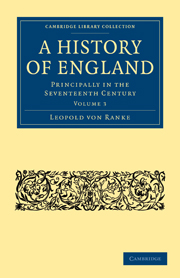Book contents
- Frontmatter
- Contents
- BOOK XI THE COMMONWEALTH IN ENGLAND, 1649—1653
- BOOK XII THE PROTECTORATE OF OLIVER CROMWELL, 1653–1658
- BOOK XIII FALL OF THE PROTECTORATE AND THE COMMONWEALTH. RESTORATION OF THE MONARCHY, 1658—1660
- INTRODUCTION
- CHAP. I Attempt to continue the Protectorate
- CHAP. II Attempt to form a Commonwealth on a new basis
- CHAP. III Royalist movements in the summer of 1659
- CHAP. IV Supremacy and constitutional projects of the Army
- CHAP. V Lambert and Monk. Restoration of the Rump Parliament
- CHAP. VI Anti-republican movement. Monk in the City
- CHAP. VII Recall of the King
- BOOK XIV THE FIRST FIVE YEARS UNDER CHARLES II. THE RESTORATION OF THE ANGLICAN CHURCH
- BOOK XV THE DUTCH WARS OF CHARLES II. ESTABLISHMENT OF THE PROTESTANT AND PARLIAMENTARY CHARACTER OF THE CONSTITUTION 1664—1674
CHAP. V - Lambert and Monk. Restoration of the Rump Parliament
Published online by Cambridge University Press: 07 June 2011
- Frontmatter
- Contents
- BOOK XI THE COMMONWEALTH IN ENGLAND, 1649—1653
- BOOK XII THE PROTECTORATE OF OLIVER CROMWELL, 1653–1658
- BOOK XIII FALL OF THE PROTECTORATE AND THE COMMONWEALTH. RESTORATION OF THE MONARCHY, 1658—1660
- INTRODUCTION
- CHAP. I Attempt to continue the Protectorate
- CHAP. II Attempt to form a Commonwealth on a new basis
- CHAP. III Royalist movements in the summer of 1659
- CHAP. IV Supremacy and constitutional projects of the Army
- CHAP. V Lambert and Monk. Restoration of the Rump Parliament
- CHAP. VI Anti-republican movement. Monk in the City
- CHAP. VII Recall of the King
- BOOK XIV THE FIRST FIVE YEARS UNDER CHARLES II. THE RESTORATION OF THE ANGLICAN CHURCH
- BOOK XV THE DUTCH WARS OF CHARLES II. ESTABLISHMENT OF THE PROTESTANT AND PARLIAMENTARY CHARACTER OF THE CONSTITUTION 1664—1674
Summary
It is surprising to find that a man like Lambert, instead of openly opposing these tendencies, became instead their mouthpiece.
John Lambert was a man of brilliant and versatile genius. He possessed a soldier's eye for the battle-field and for the tactics of blockade. Cromwell considered it a favourable omen when Lambert's views coincided with his own. He valued nothing more highly than bravery, even in a foe. It was long remembered how on one occasion he allowed six soldiers of a hostile garrison, whom his instructions required him to hand over to the executioner, to force their way through and escape. He shared with his own men the booty that fell to his share, and the gifts with which his military achievements were rewarded. In the victories gained by the Commonwealth over the Royalist and Presbyterian insurgents in Scotland and England, a great portion of the glory belongs of right to him. He ranked next to Cromwell as the second man in England. To him is due the idea, and in great measure the establishment of the Protectorate; for he possessed the faculty of discovering the proper expedients in political, no less than in military emergencies, and of persuading others to adopt them. But just as in the first fundamental measure which he originated he was careful to assert the independence of the military element in the political system, so he would never acquiesce in its subordination to the civil authority.
- Type
- Chapter
- Information
- A History of EnglandPrincipally in the Seventeenth Century, pp. 261 - 272Publisher: Cambridge University PressPrint publication year: 2010First published in: 1875

